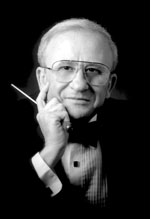By David Amos

SAN DIEGO — It happens at any level. From the beginning youngster facing that first recital, to the consummate professional. A soloist may be world famous with countless successes, but that fear of facing the public is potentially there.
Stage fright doesn’t apply to every musician. Some, never even think about it. Others, experience the tingle of excitement, just in anticipating the moment. And it is not limited to musicians. Stage actors, television and radio personalities who do live programs and even professional athletes experience extreme anxiety before “show time”.
What causes these problems? There are as many reasons as people you may ask. Many will not even want to talk about it. There are several books which have been written on this subject. The main reason many distinguished artists suffer from this is simply because they feel that their spontaneous art form should come out sounding its best, and anything less is frightening to even consider; it would disappoint their fans. This explains the notoriously many cancellations that a few world-class performers accumulated in their careers. To name only three, Maria Callas, Arturo Benedetti Michelangeli, and Vladimir Horowitz.
Horowitz took a break of approximately 10-15 years of not recording or performing to live audiences, due to neurotic anxiety. A musician whom I knew quite well, a member of Arturo Toscanini’s NBC Orchestra, told me about the frequent routine of having three stout men go to Horowitz’s dressing room, pulling him while he fought, begged and screamed, and literally tossing him into the stage, where the audience awaited him. Somehow, he regained his composure and many times under these circumstances, played some of his finest performances.
I my college days, I knew a lady pianist who spent two weeks before her recital telling me “You’ll see, I’m going to lose my place and have a memory slip during the program”, and repeated to me for two weeks after her recital, “I told you that I would lose my place and have a memory slip”.
I have heard of musicians falling asleep at home and missing the performance, smashing an essential violinistic finger a few days before the event, getting frightfully ill, or even driving to the theatre where they have played many times, and getting hopelessly lost.
Then, there is the case of another pianist who was so nervous before an important recital, that he drank strong doses of alcoholic drinks the hour before performance time. He stepped on stage, gave a deep bow to the audience, and fell into the orchestra pit, already asleep.
Most musicians you and I know and love, control these fears quite well, or don’t have them at all. But many, similar to what some athletes do, have quirky routines and weird rituals based in nothing more than superstition, to prepare them to meet the public and perform with confidence and focus.
I used to have a moderate amount of anxiety in my younger years. But, it happened only when playing the piano. My technical piano abilities were limited at best, and while I could play respectably at times, I was insecure about expressing a worthy musical message from the keyboard. Not so while conducting. Here, I found that if I had fully absorbed the musical score, knew what needed to be done, and the musicians in front of me were playing to their best abilities, I had little or nothing to worry about. Sure, there is always the pressure of not making conducting mistakes in a live concert or recording, but here, it simply comes to a degree of focus, knowledge of the composer’s intentions, and keeping the musicians involved. It didn’t matter to me if it was a school orchestra, a college or community ensemble, or the London Symphony. The key is being calm and directed to attention to details. One of the roles of a conductor (and there really are many) is to understand the abilities of the musicians, have them divest themselves of the limits that nervousness possesses, and raise the level of the performance to the highest possible level.
Another conductor who I deeply admire used to say, that in practice you should strive to play at 110%, and so if you are diminished in a performance due to nerves, you may still be at 100%. That’s why you see batters swinging three bats at the same time before stepping up to the plate. The one bat will feel lighter and manageable.
People who perform being frightened, may lose the edge of organized thinking of the intricate and subtle details which one had rehearsed previously. It becomes an emotional, uncontrolled mess, which may be a disaster, or as some in the audience may say, “What a flashing display of virtuosity! I have never seen music played so fast in such a blur!”
*
David Amos is conductor of the Tifereth Israel Community Orchestra and has guest conducted professional orchestras around the world. He may be contacted at david.amos@sdjewishworld.com
Pingback: Latest Vladimir Horowitz News | AmateurPianists